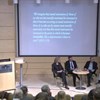addressing
Edward Page: Addressing future loss and damage associated with climate change
Edward Page, Associate Professor of Political Theory, University of Warwick ABSTRACTClimate change, by damaging the quality of life of populations already suffering from acute vulnerability and hardshi the adoption of measures of mitigation and adaptation and a ‘second-order injustice’ if the associated losses and damages arise as of these measures. Both forms of injustice involve ‘losses and damages’ arising that would not have occurred but for climate change but raise distinct normative problems given their diverging origins. This research seminar explores some key normative puzzles raised by the new ethics and politics of ‘loss and damage’ as it relates to both first-order and second-order climate change injustice. In particular, the lecture focuses on which normative principles should guide measures seeking to address first-order and second-order climate change injustices experienced by states and how (if at all) new forms of policy can be designed that respect these principles.
Perceived costs and benefits and public support for climate policies
npj Climate Action Abstract Public support for climate policies remains limited, partly due to perceived economic costs. However,using survey data from four European countries, we show that support is mperceived benefits than costs. This suggests that public discourse has overemphasized costs. Tobuild broader support, advocates should focus on communicating the benefits and effectiveness ofclimate action, rather than merely addressing concerns about economic burdens.
Stateless Studies in an Age of Artificial Intelligence Challenges, Opportunities & Setting a Future Agenda
Statelessness & Citizenship Review, 2025. From the conclusion We are at a pivotal moment where statelessness studies must engage with research and advocacy on the impact of AI on the field, as well a

Ethics of coordination
We need new ethics to understand our duties towards others in matters such as climate change.
Climate change action cannot ignore social issues
How come, despite a series of troubling new reports and studies, the world has yet to respond adequately to the threat posed by global warming? In this article, published at the website Project Syndica
From Categories to Categorization: A Social Perspective on Market Categorization
Research in the Sociology of Organizations, Volume 51, 2017 Abstract The popularity of research into categories has grown in recent decades and shows no sign of abating. This introductory article takes

Panel discussion - The Future of Humans. Moral Bioenhancement
The greatest problems of the 21st century - climate change, terrorism, poverty and global inequality, among others – are not the result of external threat, but predominantly the result of human cho

Q&A - The Future of Humans. Moral Bioenhancement
The greatest problems of the 21st century - climate change, terrorism, poverty and global inequality, among others – are not the result of external threat, but predominantly the result of human cho

Åsa Wikforss - The Future of Humans. Moral Bioenhancement
www.iffs.se Professor of Theoretical Philosophy at Stockholm University. She is currently working with the research project Knowing One’s Own Thoughts. The greatest problems of the 21st centur

Andrea S. Asker
I am a researcher at the Institute for Futures Studies and will be conducting a postdoctoral research project within the philosophy of death at Hitotsubashi University in Tokyo during the fall of 2025








